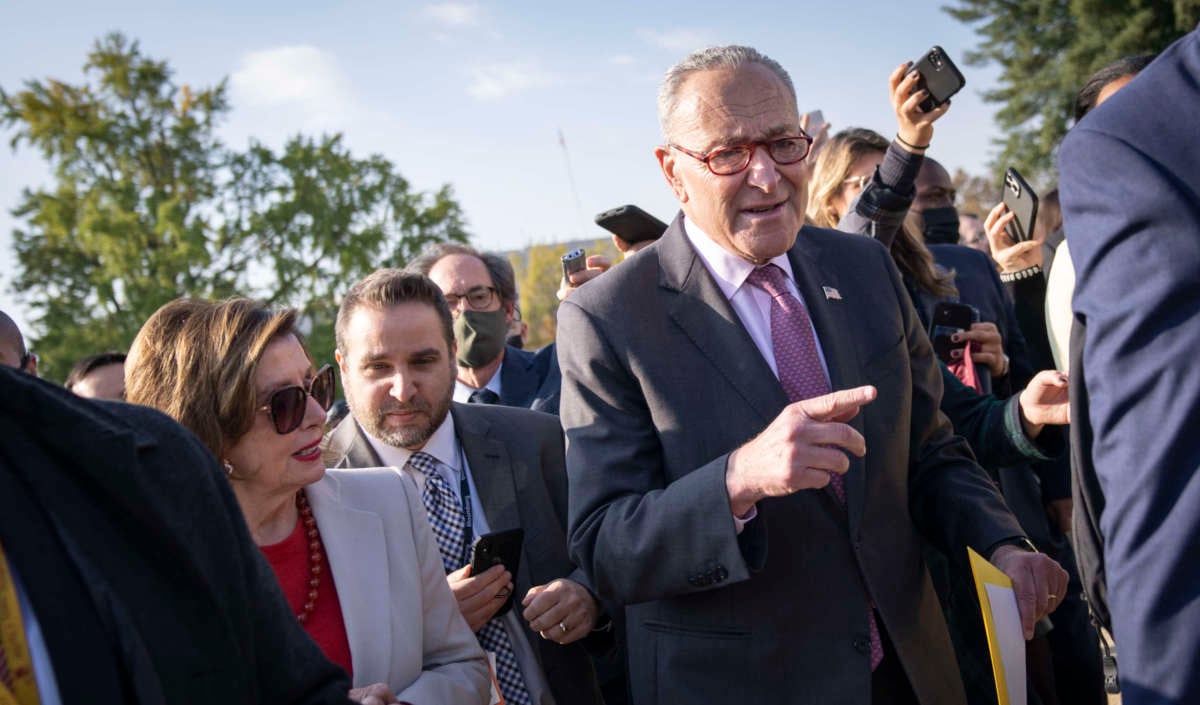Honest, paywall-free news is rare. Please support our boldly independent journalism with a donation of any size.
In the third quarter of this year, as the Democratic leaders of Congress were scrambling to decide what to keep in President Biden’s reconciliation package and what to cut, Senate Democratic leader Chuck Schumer accepted a $66,000 bundle of campaign contributions from the head of the health insurance industry’s top lobbying group.
The bundle of checks, collected and given to Schumer’s campaign by Matt Eyles, the president and CEO of America’s Health Insurance Plans (AHIP), was disclosed in a lobbyist bundling report covering July through September that Schumer filed with the Federal Election Commission. The report does not indicate the exact date that Eyles gave the bundled donations to Schumer.
A review of FEC filings shows that Eyles’ Q3 bundle is the first time he or any other AHIP lobbyist has bundled donations for Schumer. It was the largest bundle, by total dollar amount, that Schumer has received since 2016. Campaigns have to disclose bundled donations when they are forwarded to them, either physically or electronically, by lobbyists or PACs that were established by lobbyists.
Eyles’ organization is the health insurance industry’s largest lobbying group, with annual expenditures of around $60 million per year. In the third quarter of this year, AHIP disclosed lobbying the Senate and House on the Build Back Better Act and other issues that have been part of discussions around the bill. Its members include Cigna, Aetna, and Humana.
One of the group’s goals for the Build Back Better Act has been to block a proposal from the Biden White House to add dental, vision, and hearing benefits to Medicare. Most Medicare Advantage plans, such as those offered by Cigna and Aetna, include dental, hearing, and vision benefits, so adding these coverages under traditional Medicare would be a hit to the insurance companies’ competitive advantage against the government. According to Politico, insurance companies were “freaking out” over Biden’s proposal for dental, vision, and hearing Medicare coverage, but they kept it mainly behind the scenes since it would be bad optics to be seen as opposing better health coverage for seniors.
The pared-down version of the bill that emerged from the Democratic leaders’ negotiations and was put on the House floor does not include dental or vision coverage for Medicare patients. Of the three areas of health care coverage the insurance industry sought to kill, only hearing has so far survived.
Dental and vision coverage could be added back to the bill in the Senate — and Sen. Bernie Sanders (I-Vt.) has said on Twitter that they will be in the Senate version — but Sen. Joe Manchin (D-W.V.), a critical swing vote, says he opposes the coverages because he is worried about the program’s solvency.
Forty-seven percent of Medicare beneficiaries did not have dental coverage in 2019, according to a report from Kaiser Family Foundation. Without routine dental care, oral health issues often go unaddressed until individuals are in extreme pain and are forced to pay out of pocket for expensive treatments. In some cases, senior’s oral health issues can lead to fatal infections, while in many cases they have to take antibiotics that damage their intestinal microbiome and therefore weaken their immune systems.
Asked for comment on the $66,000 bundle of donations from the AHIP lobbyist, a Schumer spokesperson told Sludge that the senator “is one of the Senate’s biggest advocates for Medicare expansion and has been doing everything he can to pass the most robust legislation possible.”
Schumer’s campaign received many more health insurance industry donations in the third quarter besides the AHIP bundle. AHIP’s PAC gave him the legal maximum of $5,000 on Sept. 30, and health insurance company donations that appear in his quarterly disclosure include those from PACs affiliated with Humana ($5,000), Cigna ($1,500), Molina Healthcare ($5,000), MVP Health Care ($2,500), and more. Many more insurance executives also donated to the senator, including $20,300 from UnitedHealth Group executives like executive vice president and chief financial officer John Rex, and senior vice president of policy and strategy Catherine Anderson.
Also in Schumer’s third quarter lobbyist bundling report are bundles of $37,200 from the PAC of American Health Care Association, a nursing home group, and $46,200 from the American Council Of Life Insurers PAC, a trade association whose hundreds of member companies represent 95% of industry assets. Schumer is up for re-election in 2022.
The Build Back Better Act was passed by the House of Representatives on Nov. 19 and has been sent to the Senate, where it may be voted on under budget reconciliation rules, which do not allow its opponents to filibuster. The bill is likely to face further cuts to accommodate the wishes of conservative Democratic senators, whose votes will be needed in the 50-50 split Senate. If the bill is changed and then passed, it will be ping-ponged back to the House for another vote.
Media that fights fascism
Truthout is funded almost entirely by readers — that’s why we can speak truth to power and cut against the mainstream narrative. But independent journalists at Truthout face mounting political repression under Trump.
We rely on your support to survive McCarthyist censorship. Please make a tax-deductible one-time or monthly donation.
